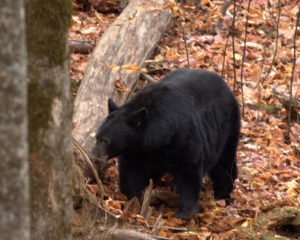
Photos of the Mountains, the Wildfire, the Bear and the Buck are by yours truly…

My wife and I just returned from a little mountain road trip that included driving the Blue Ridge Parkway from Asheville, North Carolina into Cherokee, NC. From there we drove over the top of the Smokies on Highway 411 down into Gatlinburg, Tennessee. The mountains were beautiful in some places, but much of the scenery was enveloped in a smoky haze from the numerous wild fires burning in the area.

I took this shot of a fire burning at the crest of the Chimney Tops in the Smoky Mountain National Park. The entire mountaintop was enveloped, giving the impression of a giant campfire.
A Chinook Helicopter was dropping water on the fire with apparent little effect. The smoke plume rose thousands of feet into the air.
Apparently we have a guardian angel, because we stayed the night in Gatlinburg and departed peacefully the next morning, only to learn a little while later the town was becoming surrounded by more wildfires. Only when we arrived home did we learn of the total devastation that began a few hours after our departure.

The big Black Bear pictured here was turning logs and looking for grubs only a few miles down the mountain from the Chimney Tops fire. I hope he survived.

The Whitetail buck pictured here was in a field in Cades Cove. There were no fires in that area, but the buck was so enamored with a doe that came and hid behind us, he probably wouldn’t have fled anyway.
If you haven’t signed up for the free flash fiction downloads here on this site, please do. This will put you on my mailing list, and I promise not to spam you with a lot of useless email. Also, if you decide you no longer want to be on the list, you can opt out at any time.
If you have a Kindle E-reader and want for FREE the Kindle Edition of one of my novels, contact me. The only caveat is that you must promise to write an honest review of the book when you finish.
Please send me your comments, and thanks for reading my blog.
Rick DeStefanis
You may also enjoy: Valley of the Purple Hearts and Life in the South



